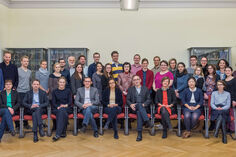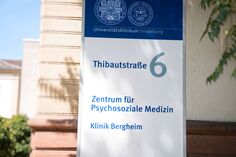About the department
Section Phenomenological Psychopathology and Psychotherapy
Research objectives and main topics:
Phenomenological psychopathology is a fundamental science of psychiatry, which investigates the basic structures of subjective experience and their alterations in mental illness applying theoretical and empirical methods. On the one hand, it goes back to the "understanding psychology" (verstehende Psychologie) of Karl Jaspers, but also conceives itself as applied phenomenology in the sense of Edmund Husserl. Its main goal is a deepened and scientifically developed understanding of the subjective experience of mentally ill people, which is an indispensable basis not only for psychopathological and neurobiological research, but also and above all for clinical-diagnostic and psychotherapeutic processes. At the Heidelberg Clinic, this field of research, with its main representatives Walter von Baeyer, Wolfgang Blankenburg, Hubertus Tellenbach, Alfred Kraus and Michael Schmidt-Degenhard, can build on a rich tradition.
The focus of current phenomenological research at the clinic is in the first place on the fundamental categories of experience of the body, space, temporality, and intersubjectivity. These experiential structures are particularly taken as a framework to analyze disturbances of the self and intentionality in schizophrenia, the experience of the body and time in depression, borderline personality disorders, dementia, and to elucidate the psychopathology and pathogenesis of delusional phenomena. The concept of schizophrenia as a disorder of disembodiment developed, among others, within the context of this research has led to the implementation of body-oriented therapeutic procedures for the treatment of negative symptoms related to schizophrenia, for example, in a randomized controlled comparative study (Martin et al. 2016). Results of the investigations on these topics have been published in numerous original papers and monographs and presented at national and international congresses.
In addition, by developing classical phenomenological approaches further, connections are being made to research in cognitive neuroscience, for example in the field of self-disturbances in schizophrenia or in analyses of the relation between mind and brain from the perspective of an "embodied and enactive cognitive science". Based on this, the concept of an "ecological psychiatry" has been developed in recent years ("Ecology of the Brain", Fuchs 2018) and has been a central building block of a widely received opinion paper on the identity of psychiatry of the DGPPN ("On the Identity of Psychiatry", Sass et al. 2019).
The interdisciplinary orientation of the section for “Phenomenological Psychopathology and Psychotherapy” has also been reflected in various national and European research projects over the past decades, such as DISCOS - "Disorders and Coherence of the Embodied Self" (2007-2011), TESIS - "Towards an Embodied Science of Intersubjectivity" (2011-2015), "Knowledge through Interaction - Towards the Development of Knowledge of Person, Self and Object" (2012-2015) as well as the Marsilius project "Embodiment as Paradigm for an Evolutionary Cultural Anthropology" (2013-2019). The historical connection to the beginnings of phenomenological psychopathology has also been firmly established in the research profile of the section since 2012 when the Heidelberg academy project of a complete edition of the works of Karl Jaspers (KJG) with Thomas Fuchs as one of the principal investigators has been initiated.
The research section publishes, in the context of the "German Society for Phenomenological Anthropology and Psychiatry" (DGAP), its own book series on phenomenological-psychopathological topics ("Schriftenreihe der DGAP", edited by Thomas Fuchs, Thiemo Breyer, Stefano Micali), which meanwhile amounts to 9 volumes. Most recently "Randzonen der Erfahrung. Beiträge zur Phänomenologischen Psychopathologie" (2020) by Thomas Fuchs has been released.
Finally, current societal, social-psychiatric and cultural-phenomenological analyses have been published in "Das überforderte Subjekt" (Fuchs, Iwer & Micali 2018) and in "Verteidigung des Menschen" (Fuchs 2020).
References:
Martin, L. M., Koch, S. C., Hirjak, D., Fuchs, T. (2016) Overcoming disembodiment: The effect of movement therapy on negative symptoms in schizophrenia – A multicenter ran-domized controlled trial. Frontiers in Psychology 7: 483.
Fuchs, T. (2018) Ecology of the brain. The phenomenology and biology of the embodied mind. Oxford University Press, Oxford.
Fuchs, T. (2020) Randzonen der Erfahrung. Beiträge zur phänomenologischen Psycho-pathologie. Alber, Freiburg.
Fuchs, T. (2020) Verteidigung des Menschen. Grundfragen einer verkörperten Anthropologie. Suhrkamp, Berlin.
Fuchs, T. (in press) In Defense of the Human Being. Interventions from an Embodied Perspective. Oxford University Press, Oxford.
Fuchs, T., Iwer, L., Micali, S. (2018) (Hrsg.) Das überforderte Subjekt. Zeitdiagnosen einer beschleunigten Gesellschaft. Suhrkamp, Frankfurt/M.
Sass, H., Maier, W., Bormuth, M., Brüne, M., Deister, A., Fuchs, T., et al. (2019) Zur Identität der Psychiatrie: Positionspapier einer DGPPN-Task-Force zum Thema Identität. DGPPN, Berlin.



